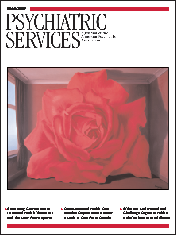A brief report in this issue of Psychiatric Services (page 407) describes a clinical trial to assess the effectiveness of a brief behavioral sexual risk reduction intervention developed for homeless men with severe mental illness by our team at Columbia University and the New York State Psychiatric Institute. This column discusses why we condensed our original intervention, Sex, Games, and Videotapes for Men (SexG), and how we did it.
A number of HIV risk reduction interventions for people with serious and persistent mental illness have now been shown to be effective in the setting of a clinical trial. At the time SexG was developed, this concept was unproven. Our team combined a psychiatric social skills training approach with cognitive-behavioral theory to develop SexG. On the basis of clinical observation and ethnographic research into the lives of the men, we incorporated humor, videotapes, and storytelling to engage the men and hold their attention. Uncertain of what dosage (length of session × number of sessions) of the intervention would be sufficient for men with psychotic disorders, we used frequent repetition of the exercises to help the men to assess their personal risk, increase their intention and motivation to use condoms, improve their condom-use behaviors, and develop solutions about how to obtain and store condoms in their impoverished circumstances. Our experience suggested that one hour was the longest period that we could expect participants to pay attention and interact. Consequently, SexG was composed of 15 one-hour sessions. Ninety-two men from an urban homeless shelter were enrolled and followed for 18 months.
The threefold reduction in sexual risk in the first six months did prove that behavioral interventions could be efficacious for this population. Our ultimate goal, however, was to develop an intervention that could be incorporated into routine programming in clinical settings and have an impact on HIV transmission on a public health level. Clinicians and counselors suggested that the lengthy SexG format was unlikely to be acceptable to providers and that attendance might be inadequate. Using a small supplement from the National Institute of Mental Health, we developed the six-session SexG-Brief.
The challenge was to preserve key behavioral change constructs and the careful ethnographic tailoring of the exercises while developing a message delivery strategy relevant to clinical care settings. We started by making four assumptions. Unprotected anal and vaginal sex are riskier than oral sex. Casual partners are generally riskier than steady partners. Risk reduction in the men's lives is best achieved by consistent and proper condom use than by efforts to promote abstinence, reduce the number of partners, or change the pattern of sexual behaviors. Alcohol or other drugs could trigger risky sexual behaviors.
These assumptions helped us to narrow the scope of SexG-Brief. Two members of our team viewed videotapes of all exercises in each session of the clinical trial of Sex-G and independently assessed them for fidelity to the curriculum and the level of interactive participation using a semiquantitative instrument. Exercises that elicited the most participation were modified to reflect the above assumptions.
The intervention dosage was based on a literature review of risk reduction approaches for persons with mental illness. The lowest efficacious dosage was six hours. The final format resulted from a suggestion from the mental health program at the homeless shelter where SexG was tested that attendance would be maximized if we structured the intervention around the free lunch offered at the program.
The tested version of SexG-Brief comprises six one-hour sessions delivered twice a day (before and after lunch) every other day. A condensed outline of the intervention is provided below.
• Saying the Word: A humorous videotape to increase knowledge, increase sense of personal risk, and introduce condom use
• The Blueprint: Promote individual risk assessment through storytelling; increase intent and motivation for condom use through role playing
• Getting It On: Advantages and disadvantages of condom use; condom use skills; negotiating use
• Modifying the Blueprint: Brainstorm behavioral change options; how to respond to a partner's request for condoms; condom skills
• Ain't No Sex: Risk from unprotected anal sex; brainstorming reduction of this practice
• Wrapping It Up: Problem-solving skills; condom skills; graduation
A copy of the manual is available from the author.

